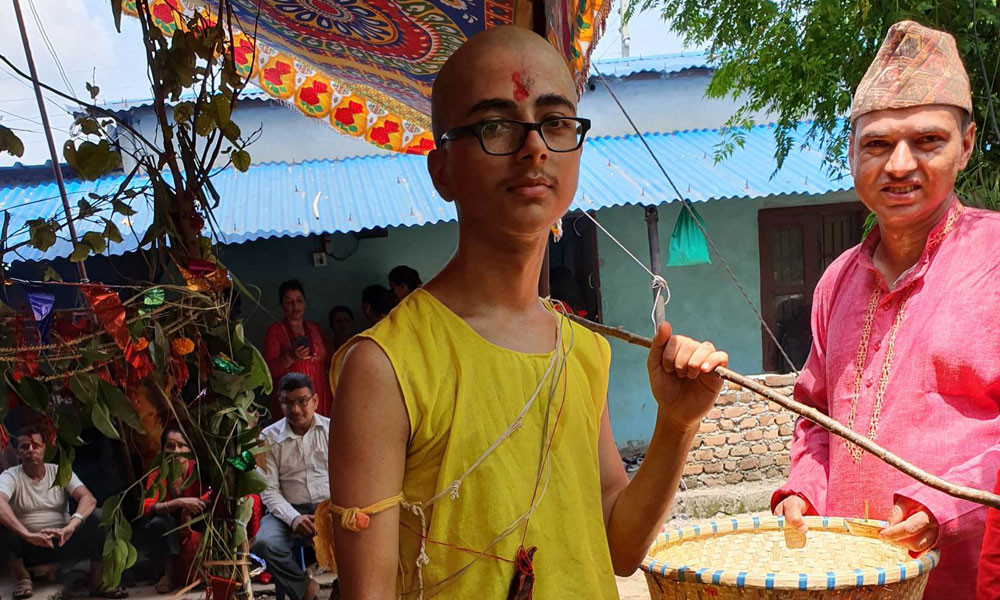Upanayana saṃskāra ( Bratbandha )
04 Jul, 2023 Himalaya Thunder Treks

Upanayana is a significant ritual in Hinduism, also known as the sacred thread ceremony. It is one of the traditional rites of passage for young boys, marking their initiation into the study of the Vedas and formal education. This ritual is primarily observed by the three upper castes in Hindu society: Brahmins, Kshatriyas, and Vaishyas.
The word "Upanayana" is derived from Sanskrit, where "Upa" means "near," and "Nayana" means "leading." It signifies leading the young boy closer to the Guru or teacher for receiving knowledge and education.
The Upanayana ceremony involves the investiture of the sacred thread (yajnopavita) around the boy's body. The sacred thread is made of cotton strands that symbolize the bond between the student and the teacher, as well as the connection to the divine knowledge passed down through generations. The ritual is typically performed by the boy's father, who becomes the boy's first Guru, or in some cases, by a spiritual mentor or a priest.
The significance of Upanayana lies in the following aspects:
-
Initiation into Vedic Studies: Upanayana marks the beginning of the formal study of the Vedas and other sacred scriptures. It is a crucial step in a young boy's spiritual and intellectual development.
-
Spiritual Transformation: The ceremony is considered to be a rebirth into a new stage of life where the focus shifts from childhood to education and the pursuit of spiritual knowledge.
-
Social Responsibility: With Upanayana, a boy becomes eligible to perform certain religious rituals and duties within society, gaining more significant responsibilities.
-
Connection to Tradition: Upanayana is deeply rooted in tradition and culture. It connects the young boy to his ancestors and the lineage of teachers and scholars.
-
Reinforcement of Values: The ceremony emphasizes the importance of discipline, respect for elders, and adherence to religious principles.
It's worth noting that in modern times, not all Hindu families observe the Upanayana ritual. The practice varies among different communities and regions. Nevertheless, Upanayana remains an essential aspect of Hindu tradition, and for those who perform it, it holds great cultural, social, and spiritual significance.
Other Blogs
-
 30 Jul, 2025
30 Jul, 2025 -
 05 Sep, 2024
05 Sep, 2024five compelling reasons to visit Nepal with Himalaya Thunder Treks:
-
 04 Feb, 2024
04 Feb, 2024Kumbhakarna Base Camp and Peak
-
 26 Jan, 2024
26 Jan, 2024Gangapurna Lake & Glacier
-
 22 Jan, 2024
22 Jan, 2024Hiking in Nepal
-
 31 Aug, 2023
31 Aug, 2023Gai Jatra or Cow Festival in Nepal
-
 31 Jul, 2023
31 Jul, 2023What is Yeti? Unconfirmed messages
-
 29 Jul, 2023
29 Jul, 2023International Tiger Day, also known as Global Tiger Day,
-
 29 May, 2023
29 May, 2023International Sagarmatha Day, also known as Everest Day
-
 27 Mar, 2023
27 Mar, 2023Exploring the Best Treks in Nepal: A Comprehensive Guide
